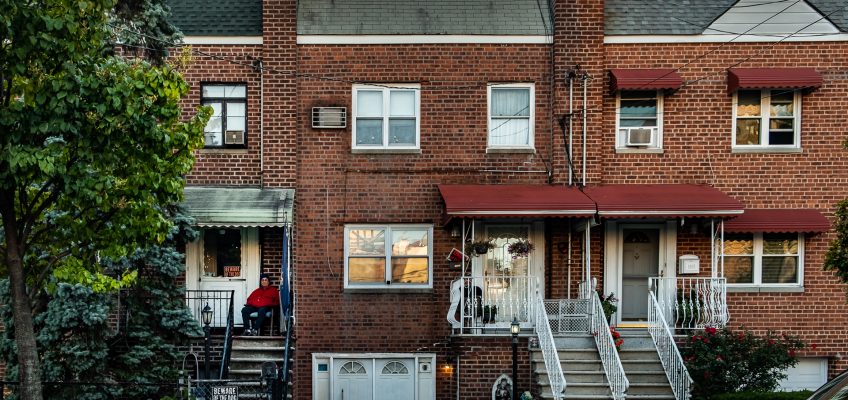“Thousands remain on the lien sale list, facing excessive fees and risk of foreclosure. Many are older adults or long-time residents, who missed notices or couldn’t navigate the system in time.”
Homes in The Bronx. (Adi Talwar/City Limits)
This summer, for the first time since the COVID pandemic, New York City restarted its tax lien sale, in which the city sells the right to collect the unpaid property taxes and water bills of New Yorkers to private investors.
Families can face foreclosure and displacement simply because they fell behind on bills, often by just a few thousand dollars. While the sale can be effective in collecting taxes placed on commercial properties and apartment complexes owned by larger landlords, the reality is that it unfairly targets thousands of New York’s small homeowners over comparatively small arrears for property taxes, sewer bills or emergency repairs. This year, nearly half of the properties on the lien sale list were one- to three-family homes.
Take one Legal Services NYC client: a woman in her 90s who was blind and should have been exempt from the lien sale because of her age and disability. But the city’s rigid rules require homeowners to repeatedly recertify exemptions—even when nothing about their eligibility will ever change. When she visited a service center with her granddaughter, staff failed to renew her exemption and instead put her in an unaffordable payment plan. Her lien was sold to a debt buyer, and she was sued in foreclosure, and only after finding a Legal Services attorney was she able to undo the sale and stay in her home. Had she lost it, the cost to the city of her homelessness would have far exceeded the few thousand dollars still owed.
Since its infamous introduction by then-Mayor Rudy Giuliani, the tax lien sale has disproportionately harmed low- and moderate-income homeowners, particularly in Black and Latino neighborhoods, and our elderly neighbors, accelerating displacement and housing insecurity in communities that have already borne the brunt of redlining, disinvestment and rising costs. Consequently, the sale deepens long-standing racial disparities, with data showing that Black homeowners are six times more likely to appear on the lien sale list than white homeowners.
This year, the Center for NYC Neighborhoods, working with City Hall, the City Council, agencies, and dozens of community organizations, mounted a major effort to limit the damage of the lien sale. When the City issued its 90-day notice list—a list that immediately puts vulnerable homeowners at risk for scams and fraud—The Center for NYC Neighborhoods launched an intensive outreach campaign. It sought to connect at-risk homeowners with housing counselors, free legal help through organizations like Legal Services NYC, and with city programs like Easy Exit, which can remove eligible properties from the sale list for a year. These groups worked around the clock to screen homeowners for exemptions and other relief.
Their efforts removed over 7,300 properties from the sale list, while the city and Council also expanded hardship programs, clarified eligibility rules, and broadened community outreach, ultimately allowing for real progress. But many homeowners still struggled to access exemptions as the city’s Department of Finance and Department of Environmental Protection were overwhelmed, delaying and even changing application processes midstream.
Thousands remain on the lien sale list, facing excessive fees and risk of foreclosure. Many are older adults or long-time residents, who missed notices or couldn’t navigate the system in time. Even those who were removed remain vulnerable because their debt information remains public, making them targets for scams and deed theft, especially in neighborhoods like Southeast Queens and Central Brooklyn that are targets for predatory actors. The costs of the lien sale far outweigh the benefits.
The tireless work of housing counselors and legal aid groups has saved thousands, but without policy reform, it’s only a temporary Band-Aid. We should not have to race against the clock each year to prevent harm. City programs should not put our vulnerable neighbors at risk.
Programs like income-based repayment plans, the Property Tax and Interest Deferral (PTAID) program, and permanent exemptions for seniors and people with disabilities must be expanded, better funded, and extended to water debts. And class 1 and 2 properties—one- to three-family homes and owner-occupied condominiums—must be removed from the tax lien sale entirely.
The tax lien sale is neither sustainable nor just, and New Yorkers deserve a system that helps them stay in their homes, not one that pushes them toward foreclosure and displacement.
Rachel Geballe is the deputy director of Legal Services NYC.
The post Opinion: New York City’s Tax Lien Sale is Harmful to Vulnerable Homeowners appeared first on City Limits.


Leave a Reply